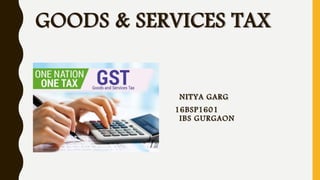
GST IMPACT ON HOSPITALITY INDUSTRY
- 1. GOODS & SERVICES TAX NITYA GARG 16BSP1601 IBS GURGAON
- 2. INTRODUCTION OF GST IMPACT ON HOSPITALITY SECTOR
- 3. HOSPITALITY INDUSTRY • One of the fastest growing sector 6.23% in National GDP 8.78% in total population • It includes • Food and services sector Lodging and accommodation sector Travel and Tourism(also)
- 4. OVERVIEW OF GST WHAT IS GST ? GST is a destination based VALUE ADDED TAX. It offers comprehensive and continues chain of tax credits. Ultimate burden borne by the final Consumers. No Cascading of Taxes
- 5. WHY WE NEED GST? WHO WILL PAY GST? Deficiency in the exist VALUE ADDED TAXATION LEADS TO GST A cure for existing IDT REGIME
- 6. SECTION 9,MODEL GST A person who carries business at any place India/State who is registered or required to be registered under Schedule III of the Act.(levy and collection) EXISTING REGIME SERVICE TAX 12% TO 14.5% VAT 12%TO 14.5% LUXURY TAX 12% S E T GST
- 7. A hotel is an establishment that provides paid lodging on a short-term basis . Small, lower-priced hotels may offer only the most basic guest services and facilities . Larger, higher-priced hotels may provide additional guest facilities such as swimming-pool , business centre , etc.
- 8. The GST on room tariffs proves to be a double edged sword ! Let’s understand this with an example.
- 9. CASE 1 Room tariff = ₹ 5000 Before GST , taxes = 20% Final room rate before GST = ₹ 6000 After GST, tax = 18% Final room rate after GST = ₹ 5900 CASE II Room tariff = ₹ 8000 Final room rate before GST(including tax) = ₹ 9600 Final room rate after GST (tax 18% ) = ₹ 10240
- 11. PRE GST SERVICE CHARGE @10% VALUE ADDED TAX @12.5% SERVICE TAX @5.6% SWACHH BHARAT CESS @ 0.2% KRISHI KALYAN CESS @ 0.2%
- 12. POST GST • Restaurants with a turnover of less than ₹ 50 lakhs will be levied tax rate of 5% . • Non-AC restaurant will have 12% tax rate . • AC restaurants will have to shell out 18% tax . • Five-Star restaurants will have to submit a luxury tax of 28% .
- 13. PROS OF GST 1. Administrative Ease • GST will abolish several other taxes , leading to a reduction in procedural steps and more chances to streamline the taxation process. 2. Clarity for Consumers • It was sometimes difficult to differentiate between a Value Added Tax and an entertainment tax for the common man. However, under the GST regime customers will see only a single charge on their bill and it would give them a clear picture of the tax they are paying. 3. Improved Quality of Service • How many times have you had to wait in the hotel lobby wondering if you would miss your flight back home because your bill being prepared? With just one tax to compute , the checking out processes at hotels and restaurants will now become easier- another perk that the hospitality industry can brag about.
- 14. CONS OF GST 1. Increased Technological Burden • When the service tax was first introduced , there were a lot of mix ups. GST , thankfully , has very clear guidelines on how each industry needs to manage their accounts and file returns but it will require businesses to become technologically adept , increasing the technological burden and cost for compliance. 2. Increased Costs • In Maharashtra, for instance , hotel rooms were earlier taxed at 19% and food and beverage at 18.5% . Even with GST charged at 18% , there is only a minimal cost reduction in both cases. Businesses will also look to recover the additional cost of technology and new systems from their customers, which might – in some instances – lead to higher tariffs . 3. Lack of Parity with Asian Counterparts • As India becomes an even bigger player in the global hospitality and tourism industry , we need services to be at par with global rates. Our Asian neighbors such as Japan and Singapore have very low tax rates for their hospitality sector which is an important reason for them ranking high on tourist wish lists .
- 15. CONCLUSION GST is a mixed bag of better and easier rules and regulations , and increased costs and compliances . The Hotel and Restaurant Association of Western India had been lobbying for a GST rate of 5% as it believed that a lower rate will bring in more tourists and allow Indian businesses to compete with global chains. However , the GST Council deemed it fit to set the rate at 18% . The Tourism and Hospitality industry in India is expected to grow to US$ 280.5 billion by 2026 , and the initials hiccups after GST implementation are highly unlikely to be seen whether the cons outweigh the pros for this sector. There wouldn’t be much of a difference to what customers would be paying , if anything it works in the guest’s favor . Luxury hotels may see a drop in occupancy in the coming months since there would be a significant increase in their pricing , but for the other hotels , it would pretty much be work as usual , apart from just double checking that the GST norms are being followed accurately .
- 16. THANK YOU!